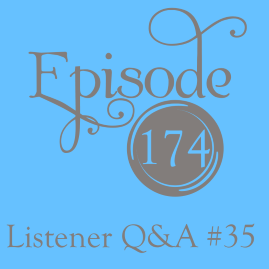
This is a monthly question and answer episode discussing how to interest our husbands in Charlotte Mason’s method, how to implement narration as an adult, and how and what can be done for children after school hours who attend a non-Charlotte Mason school.
Listen Now:

“Let the objector read an essay of Lamb’s, say, or of Matthew Arnold’s, Lycidas or the ‘ raven ‘ scene in Barnaby Rudge and then put himself to sleep or wile away an anxious or a dull hour by telling to himself what he has read. The result will be disappointing; he will have forgotten this and that turn of thought, link in the chain of argument, but he will know the whole thing in a surprising way ; the incidents, the figures, the delicate play of thought in the author will be brought out in his mind like the figures in the low relief which the sculptor produces from his block. He finds he has taken in ‘mind stuff’ which will come into use in a thousand ways perhaps as long as he lives.” (6/258-259)
“The War has forced new ideas upon us ; we begin, for instance, to realise the avidity of the adult mind for instruction; it was startling to read of 1,500 soldier candidates for twenty vacant places in a certain class. We begin to see that mind, the mind of all sorts and conditions of men, requires its rations, wholesome and regularly served.” (6/281)
“Some absorbing interest which shall keep our minds and senses healthily occupied and lead us to evergrowing knowledge of God’s universe, will add to the healthfulness of a holiday…While freedom and spontaneous enjoyment should still be distinctive of our holiday-season, there are ways in which, without any sacrifice of the spirit of either, a parent or tutor may give a direction to a [student’s] impulses which shall lead him to unfailing sources of delight and improvement.” (PR 4/513, 514)
“…the child shall be allowed to be alone with children and Nature a good part of every day. [Holidays will be most enjoyed, however,] if one hour or so every day is given to some fixed employment, of a kind as far as possible outside the ordinary school curriculum.” (PR 14/894-901)


Summer learning question: We will be finishing our third term of 1b in a few weeks. We have been making slow progress in math and reading, not because she doesn’t understand, but because she has trouble focusing. I am thinking about continuing those two subjects through the summer, but alternating them so that we would just do one subject each day. Would this be helpful, or too much? I don’t want to lose ground over the summer. I am also planning to read to her for fun and spend longer stretches outdoors.
Ashley,
Your child is young, and nothing would be gained and much could be lost by continuing formal lessons all summer, no matter how lightly. The outdoor time is invaluable for both math and reading skills as she
learns to observe closely and continues to develop relations with all manner of things.
Most years begin with a 4-6 week long walk-through review of math anyhow, so you will probably be surprised at what she has retained, especially if you continue to do “by the way” number or problem work
in math. Make a little book of all the words she does know automatically by sight and when you are reading to her, occasionally point out words she knows and ask her what they are. You could have her read to you from something she can read a little every day, but all very lightheartedly. Mostly play, do handwork, and stay outside enjoying the outside world we don’t get to know in wintertime.
Liz